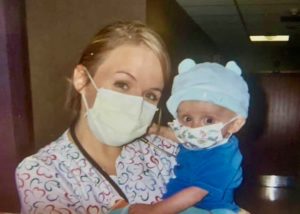For nearly a decade of my life, I had the honor of working as a pediatric transplant nurse. I cared for infants born with anatomical abnormalities that caused their tiny livers to fail. I held hands with terrified parents as we hurriedly ran through the pre-transplant checklist when they got “the call”. I laughed with a school-age patient who finally experienced what it was like to “pee” after a lifetime of dialysis. Those memories make me laugh and cry and give thanks for the humbling opportunity it was to walk with those patients and families for that season of their lives.
There was also deep deep sadness. Children who became too sick too fast. Donor organs that failed to offer that last thread of hope for which we desperately prayed. Parents who faced a reality that I found incomprehensible. It was only after I became a mother myself that I felt the true weight of organ transplantation. As I checked vital signs, administered medications, drew blood, I would imagine how overwhelming this situation would be for these weary parents. How unsteady it would feel to live life on the edge waiting for the call that would give your child hope of a second chance. I also spent many hours thinking of the donor parents and the strength of a mother or father to make a decision to donate.
National Donor Day is February 14th and Donate Life America has several ways you can help become part of the movement to reduce wait times for organ transplants. The easiest way- register to be a donor! There is a common misconception that your decision to become an organ donor will impact the medical care you receive if you are gravely injured or sick. Rest assured, as a nurse, I can solemnly swear this is utterly false. In any emergency, the entire medical staff will work tirelessly to save a life. It’s the goal. It’s what every doctor, nurse, paramedic, and support staff works to do. But registering to become a donor and making your wishes known to your family can bring hope from a hopeless situation. I have been witness to it countless times.
There are several ways to become a living donor. Registering to become a bone marrow donor is as simple as a mouth swab. Your cells are tested for tissue markers and that data is collected in a national registry. If your tissue markers are a match for someone waiting for a transplant, you may be called for additional testing. Then something as simple as a blood collection or bone marrow aspiration can save a life. You can learn more about joining the bone marrow donor registry at www.bethematch.org
Certain solid organ transplants can be performed with living donors. One of my favorite days as a pediatric transplant nurse were those when we cared for living donor kidney transplants. Often times these were parents, aunts, uncles, family members or friends who were a match for a child waiting for a kidney transplant. I cried more than once watching a parent donate a kidney to save the life of their child. Locally, you can learn more about IU health living kidney donation here.
If you are not ready to commit to organ donation at this time, you can help fundraise and increase awareness. The cost of organ donation is astronomical. Estimates range from $500,000- $1,000,000 and this does not include the lifetime of follow up care all transplant recipients need. Almost all transplant recipients need to remain immunosuppressant medication for their lifetime. In the pediatric transplant population, something as simple as a common cold can cause lengthy hospitalizations. Many programs are in place to help support the financial burden of organ transplants.
Those years I spent caring for the smallest of organ recipients were life-changing. They formed how I look at life and medicine and hope and sadness. I am eternally grateful I had the opportunity to witness first hand the miracle of organ donation. Death is inevitable but with organ donation, hope can rise from the grief.
I leave you with a picture of hope. This is Kameron when he was about 6 months old. Three months before Kameron received an isolated small bowel transplant. All of the nurses grew to love Kameron (and his family) as our own. His road has not been easy but today Kameron is a thriving 14-year-old. All because a family made the decision to donate life.









